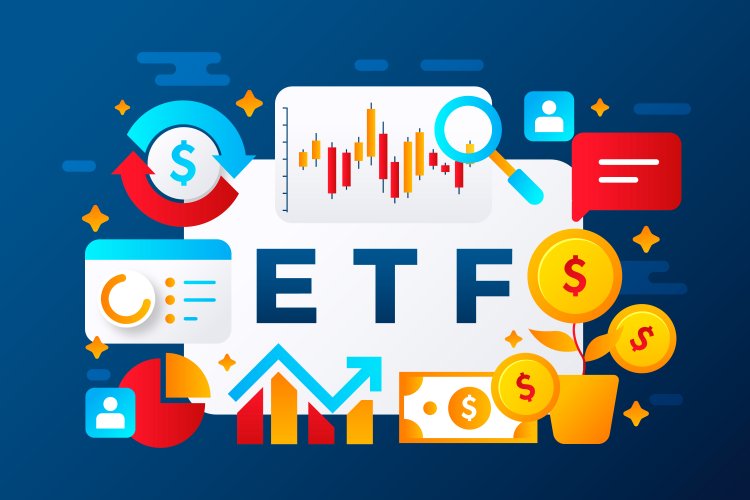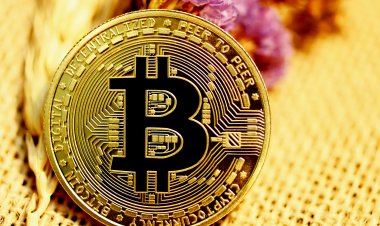10 things you must know about buying gold ETFs and the best for 2024
Learn everything you need to know about Gold ETFs in India! This guide covers what they are, why to choose them over physical gold, the top options to invest in 2024, and more.

It's well known that Indians have a strong interest in investing in the precious metal known as "gold." People often store gold as a financial safety net, accumulating it to quickly convert into cash when needed. This provides a convenient source of funds in unexpected situations. Many Indian households have adopted the practice of buying and storing physical gold, whether at home or in a bank locker. However, this practice comes with its own set of challenges. What is the storage capacity of your system? What about theft concerns? Today, there is now an alternative to investing in physical gold: the gold ETF. Many people in India choose to store gold in the form of jewelry, which is often given as gifts and worn during special events. However, younger generations are now considering a more secure choice for investing in metal.
Gold Exchange Traded Funds (ETFs) represent units of gold that are issued and backed by physical gold held by a custodian bank. In India, gold ETFs have been available for more than a decade, but they haven't gained significant popularity, even though gold prices have been consistently declining since September 2011. The Indian Gold ETF segment is significantly smaller when compared to the global ETF industry in terms of size. The total assets under management (AUM) of Indian gold ETFs is less than $1 billion, while the Spider Gold ETF, the largest gold ETF in the world, manages over $35 billion in AUM. If you're looking into a gold ETF, India has some options worth considering. However, it's important to familiarise yourself with gold ETFs in general before making any decisions. Take a look at some of the biggest gold ETF managers globally.
Why choose gold ETFs?
Now that you've grasped the concept of gold ETFs, you might be curious about the reasons to consider investing in this method of gold investment. Here are the reasons explained clearly and concisely:
-
Gold ETFs eliminate the need to store physical gold, making things much simpler.
-
Investing in gold ETFs is similar to purchasing the metal in the form of 24-carat gold units.
-
Investing in gold ETFs provides a high level of security, giving you peace of mind against potential theft.
-
Gold ETFs ensure the purity of gold.
-
You won't be charged for your spending since you're not purchasing physical gold.
-
Investing in gold ETFs is a breeze! It's super convenient and can be done with just a few clicks online.
What is a gold ETF?
Can you please explain what a gold ETF is and how it functions? Before you invest in a gold ETF in India, it's important to have a clear understanding of some fundamental concepts. Now, let's take a look at the situation of gold ETF investment in India. Let's dive into 10 important aspects to consider when investing in gold ETFs.
1. Gold ETFs are a viable choice for investing in gold.
Investing in gold can be done in several ways. You have various options to invest in gold, such as purchasing physical gold bars, investing in gold bonds issued by the RBI, buying e-gold from commodity exchanges, or even investing in gold futures. One of the benefits of gold ETFs is that they can be easily held in your regular demat account and can be bought and sold just like any other stock. Gold ETFs are quite easy to buy and sell in India.
2. Gold ETFs are easily tradable on exchanges, just like stocks.
Here's another point to consider: you have the option to purchase and sell gold ETFs on the regular stock exchange using your current trading account. Similar to shares, these gold ETFs will be credited or debited to your demat account and do not have any lock-in requirements.
3. Buying or selling gold ETFs does not affect the fund's AUM.
Gold ETFs differ from regular mutual funds in this aspect. When you purchase units of a mutual fund scheme from the AMC, the assets under management (AUM) of the fund increase. Conversely, when you sell units, the AUM of the fund decreases. When it comes to an ETF, ownership simply changes hands from the seller to the buyer, and the total value of the ETF stays the same.
4. The gold custodian stores real gold that supports gold ETFs.
If you're worried about the fate of your money, it's worth noting that gold ETFs are regulated by SEBI, and each unit is backed by physical gold. Typically, gold funds store their physical gold with the Bank of Nova Scotia. You can be confident that an equivalent amount of physical gold backs each unit of gold in the ETF.
5. Gold ETFs track the price of gold.
Gold ETFs carry a similar price risk as physical gold. When the price of gold increases, the price of the gold ETF follows suit, and the same is true in reverse. There are no other factors at play; only the price of physical gold affects the price of gold ETFs. GOLDBEES, the biggest gold ETF in India, operates with just a fraction of 1 gram of gold.
6. Gold funds offer a way to diversify your investment portfolio by including assets other than stocks.
Gold and equity typically have a minimal connection, and sometimes they even move in opposite directions. That's the reason why having gold in your investment portfolio, around 10–15%, can help protect you from the ups and downs of the economy and stock market.
7. Gold ETFs are most effective during periods of global uncertainty.
You'll see this repeatedly. During periods of economic and geopolitical uncertainty, gold prices have a tendency to rise. In the 1970s, amidst global conflicts, the value of gold skyrocketed by nearly 25 times. Following the Lehman crisis, the price of gold continued to rise until September 2011, when it reached its peak. Gold can be a reliable safeguard during periods of heightened global uncertainty.
8. Gold ETFs, just like any other asset, are subject to capital gains tax.
When you redeem gold ETFs, you may be required to pay capital gains tax. There's a slight distinction in this case. Gold ETFs are considered non-equity assets, so their short-term definition is extended to 3 years instead of the usual 1 year. In addition, the tax rate for LTCG will remain at 20% even after factoring in the advantages of indexation.
9. STT does not apply to gold ETFs.
Securities Transaction Tax (STT) does not apply to gold ETFs. That's because STT typically applies by default to equity and equity products. Gold ETFs are not subject to STT because they are classified as non-equity products. That actually boosts the return on investment for gold ETFs.
10. Gold ETFs serve as a hedge rather than an investment.
People must grasp this key point about gold ETFs. These are not investments that can generate value over time, like stocks or bonds. Those are hedges. That implies their purpose is to safeguard value during periods of political and economic turmoil when the values of other assets are being strained. For more information on the distinction between gold ETFs and gold mutual funds, simply click here.
You should definitely consider adding gold ETFs to your portfolio, as they provide valuable protection. Once you understand these fundamentals, you can confidently allocate a portion of your portfolio to gold ETFs.
Top Indian Gold ETFs to Invest in 2024
Gone are the days when people in India used to exclusively hold physical gold. While many Indians continue to view physical gold, such as ornaments and bars, as the primary means of investing in gold, there is a growing interest in gold ETFs among investors. Many individuals are unfamiliar with the concept of a gold ETF. However, once they gain an understanding, they quickly recognize the advantages of investing in these gold exchange-traded funds.
What are gold ETFs?
If you want to invest in gold stocks after opening a Demat account, you have a couple of options. You can either go through the stock market or consider ETFs (exchange-traded funds). Investing in these is possible through mutual funds, which can be bought and sold at market prices. In simple terms, a mutual fund that invests in gold assets is basically an ETF of gold. This fund is focused on commodities, specifically gold, and it closely follows the price of gold. Trading gold ETFs is similar to trading stocks on stock markets, and you can assess their performance in a way that is comparable to how you evaluate the performance of stocks.
Exchange-traded funds represent assets like physical gold, whether in dematerialized or paper form. Investors have the option to invest in stocks as an alternative to physically owning the metal. Once the trade is complete, investors receive the equivalent value in cash instead of physical gold, which is then credited to their accounts.
The Advantages of Gold ETFs
Today, investors are seeking diversification in their financial portfolios by combining investments that offer potential rewards, even if they come with some level of risk. This includes considering investments in upcoming IPOs. What is the best way to mitigate risk? Investing in a reliable asset that maintains its value and provides liquidity even during times of inflation is a smart choice. Gold ETFs play a significant role in this scenario. Let's explore the main advantages of investing in gold ETFs:
-
They help spread out your investments and give you exposure to different sectors, such as manufacturing and gold mining.
-
Investing in gold ETFs provides a sense of security, as you can avoid concerns about the risk of physical gold theft.
-
Gold ETFs eliminate the need for storing physical gold, making it much more convenient.
-
Investing in gold ETFs provides similar benefits to investing in physical gold, serving as a safeguard against inflation and offering liquidity.
-
Investing in gold ETFs is a breeze. They offer the assurance of gold purity and provide transparency when you decide to sell them.
Top Gold ETFs in India in 2024
Gold ETFs are funds that are managed passively, meaning they simply track the value of physical gold based on market conditions. The funds invest your money in gold bullion, which is extremely pure gold. Investors in gold ETFs can make profits when the price of gold rises in the market. These are a few excellent gold ETFs worth considering for investment in 2024:
|
Gold ETFs |
Highlights |
|
HDFC Gold ETF |
Expense Ratio = 0.59% |
|
AUM = Rs.3353.55 Cr. |
|
|
SBI Gold ETF |
Expense Ratio = 0.64% |
|
AUM = Rs.2824.08.55 Cr. |
|
|
ICICI Prudential Gold ETF |
Expense Ratio = 0.5% |
|
AUM = Rs.3332.52 Cr. |
|
|
Kotak Gold ETF |
Expense Ratio = 0.55% |
|
AUM = Rs.2580.36 Cr. |
|
|
Axis Gold ETF |
Expense Ratio = 0.53% |
|
AUM = Rs.756.85 Cr. |
|
|
IDBI Gold ETF |
Expense Ratio = 0.35% |
|
AUM = Rs.94.67 Cr. |
|
|
Invesco India Gold ETF |
Expense Ratio = 0.55% |
|
AUM = Rs.89.3 Cr. |
|
|
UTI Gold ETF |
Expense Ratio = 1.13% |
|
AUM = Rs.817.90 Cr. |
|
|
Aditya Birla Sun Life Gold ETF |
Expense Ratio = 0.54% |
|
AUM = Rs.355.56 Cr. |
|
|
Quantum Gold ETF |
Expense Ratio = 0.78% |
|
AUM = Rs.154.60 Cr. |
The Investors Who Invest in Gold ETFs
Gold ETFs can be a great option for investors who want to closely monitor the real-time prices of gold. Then, some people might not want to buy physical gold but still want to diversify their finances with this investment. Investors can participate in the market's metal performance and commodity prices.
Practical Investment
Investing in gold ETFs provides individuals with a convenient option to invest in gold without the hassle of storing the physical metal. Moreover, if you decide to open a Demat account now for investing in stocks, you might want to consider gold ETFs as a way to reduce the impact of unpredictable market conditions. Investing in pure gold can help protect you from potential risks. Gold ETFs offer a convenient solution for those who prefer low-risk investments and want to ensure the safety of their commodity investments. For conservative investors, there is an opportunity to invest in gold straightforwardly and transparently. In addition, the fees for investing in ETFs are not high. Make sure to consider an upcoming IPO when searching for a gold ETF investment.



 admin
admin 










